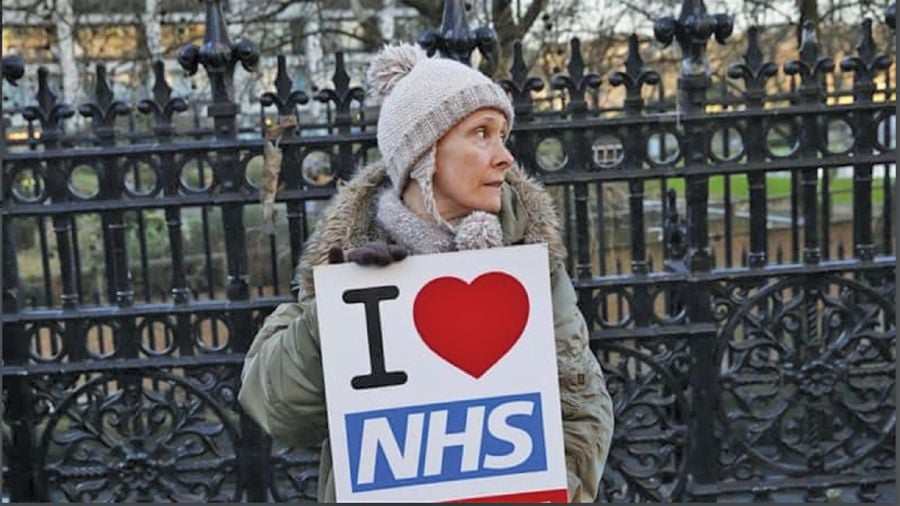IT is “the closest thing the English have to a religion”. It is a national institution that no British political party would dare to abandon let alone privatise. It is the envy of the world, a healthcare model to be emulated because it is “free at the point of delivery” for citizens and residents — not surprisingly attracting wannabe medical tourists from abroad at the expense of the British taxpayer.
This week on July 5, Britain’s pioneering National Health Service (NHS) celebrates its 70th anniversary at a time when the institution is under great scrutiny and pressure in terms of funding, meeting the demands of a growing and ageing population, the “short-termism” of government and management policy and planning, and “out of control” inward migration.
The NHS is a victim of its own success. It is under the NHS that scientists James Watson, Francis Crick, Rosalind Franklin and Maurice Wilkins first revealed the structure of DNA at Cambridge University in 1953 — the very genetic material that makes up humans; the link between smoking and cancer was established a year later; daily hospital visits for children were first introduced; polio and diphtheria vaccinations were launched in 1958; and patients with mental ill health should not be considered any different from other types of sick people under the 1959 Mental Health Act. The rest is history.
The impact has been phenomenal. Mortality rates declined sharply, and with today’s advances in technology, informatics, computer-aided design and diagnostics, robotic surgery and in medical research, new drugs, stem cell therapies and genome mapping, people are surviving diseases, which a few decades ago would have meant certain death. This has led to increased longevity.
This scenario continues despite the onset of new diseases of the affluent society especially increased alcohol, tobacco and drug abuse; obesity, which has seen Type 2 diabetes, largely related to diet and lifestyle, flourish; cancer and heart disease soar in all societies, including Malaysia, no matter how remote.
It is a far cry from July 5, 1948 when Aneurin (Nye) Bevan, then Labour Health Secretary and one of my political heroes, officially launched the NHS at Park Hospital in Manchester, two years after the passing of the National Health Service Act in 1946.
At a stroke, some 1,143 voluntary hospitals with 90,000 beds and 1,545 municipal hospitals with 390,000 beds were subsumed within the new NHS. Bevan’s prophetic words said it all: “This is the biggest single experiment in social service that the world has ever seen undertaken.” It was also the first time anywhere in the world that free healthcare was made available on the basis of citizenship.
The right to universal medical treatment under a new national health service was first proposed by an inter-departmental committee led by Sir William Beveridge, that looked into various schemes including social insurance and allied services. In 1942 the so-called Beveridge Report recommended that “medical treatment covering all requirements will be provided for all citizens by a national health service organised under the health departments and post-medical rehabilitation treatment will be provided for all persons capable of profiting by it”, with the GP system set to become “the Jewel in the NHS crown”.
That report, together with the 1944 White Paper titled “A National Health Service”, saw both Conservative and Labour parties commit to ensuring free access to healthcare in their manifestos in the 1945 general election, which Labour under prime minister Clement Attlee won. It was Bevan’s appointment as Health Secretary that proved crucial. Having witnessed the decimation of patients, especially the poor at the hands of private medicine, especially in his Ebbw Vale constituency in south Wales, Bevan discarded previous compromises and proposed a health system based on regions and taking all hospitals into public ownership.
“The collective principle asserts that ... no society can legitimately call itself civilised if a sick person is denied medical aid because of lack of means,” he had stressed.
Britons can count themselves lucky. Whatever the sentiments about whether the NHS is better than the Dutch, German or French health systems and whether it is sustainable given its current problems, it remains a revered model for the majority of Brits. Enough of NHS bashing! The aim is to forge a collective long-term solution for the future of the NHS involving policy makers, administrators, clinicians, nurses and patients.
Creeping privatisation is a danger. During Tony Blair’s government, Chancellor Gordon Brown’s policy of funding new hospitals through public finance initiative was disastrous, besetting some hospital trusts with crippling debt payments for decades to come.
Labour’s engagement of management consultants to run hospital wards was as ridiculous as it was money down the drain. The use of agency nurses at great cost instead of training more nurses, the bloated NHS bureaucracy where top officials are paid more than the prime minister, the billions of pounds wasted on computerisation systems that became obsolete even before they were fully installed, and the lumping of social care on the NHS, where medically fit elderly patients cannot be discharged because they do not have a care home to go to, give the impression that the days of the NHS are numbered.
Change is a necessity, but not at any cost. The NHS employs 1.7 million people, which makes it the fifth largest employer in the world. Today 30 pence of every taxpayer pound spent goes to health. While NHS spending has gone up with Prime Minister Theresa May pledging to spend an extra £20 billion (RM106.47 billion) a year in England by 2023, the number of hospital beds has declined.
Yet, Britain still spends less per capita on healthcare than some European counterparts. Whether it is an extra penny in the pound in income tax, which I, like many others, would be glad to pay, combined with the occasional corporate windfall tax, evolving the NHS for the next generations without losing sight of Bevan’s adage, will no doubt dominate the political debate in Britain for perhaps the next 70 years.
The writer is an independent
London-based economist and writer
Get the latest World Cup 2018 scores, highlights and updates from our dedicated World Cup page






